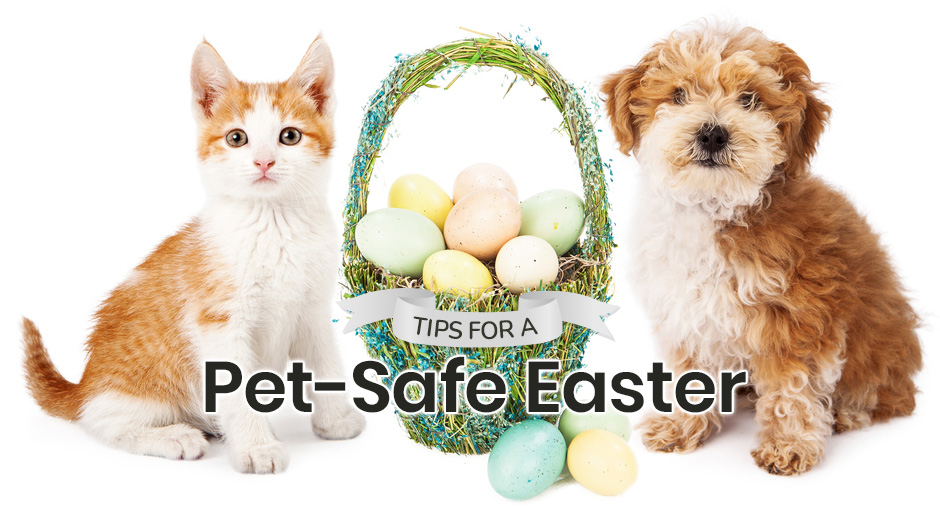Easter will be here in a few short days. As the first warm-weather holiday of the year, many people enjoy decorating their homes and gathering with friends and family. If you have pets, it's important to prepare for Easter with them in mind. Chocolate, plastic grass, and several other staples of this holiday can be dangerous for pets if ingested.
Don't Share Food or Treats with Pets
An Easter basket filled with candy is just too tempting for some pets to resist. Dogs may eat all of its contents while cats may chew on the plastic grass it contains. To prevent poisoning or a choking hazard, be sure to keep your children's Easter baskets out of reach of pets. Xylitol, which is an artificial sweetener added to numerous types of candies, can cause liver failure and seizures. The primary ingredient in chocolate, theobromine, causes hyperactivity, increased heart rate, and seizures in severe cases.
An Easter basket filled with candy is just too tempting for some pets to resist. Dogs may eat all of its contents while cats may chew on the plastic grass it contains. To prevent poisoning or a choking hazard, be sure to keep your children's Easter baskets out of reach of pets. Xylitol, which is an artificial sweetener added to numerous types of candies, can cause liver failure and seizures. The primary ingredient in chocolate, theobromine, causes hyperactivity, increased heart rate, and seizures in severe cases.
It's also important to avoid feeding table scraps to pets. They often contain bones that your pet could choke on as well as spices and a high fat content. It's best to keep your pet in another room during the meal if you think your guests may be tempted to give your pet "just a taste."
Some dogs and cats also become highly anxious around people they don't know. This could result in unpredictable behavior that may lead to injuries. While you might know your pet, you don't know how your guests may behave. This is especially true with small children. It's better to play it safe by keeping your pet comfortable in a separate room until the festivities are over.
Other Common Pet Hazards at Easter Time
Most pets are curious and need to investigate anything they don't recognize. Plastic eggs and Easter grass are no exception. If your pet chews on a plastic egg, hard pieces of plastic could break off and get lodged in her throat. A single string of plastic grass could cause health hazards as well. Once your children find their baskets in the morning, they should keep them in their rooms with the door closed.
Most pets are curious and need to investigate anything they don't recognize. Plastic eggs and Easter grass are no exception. If your pet chews on a plastic egg, hard pieces of plastic could break off and get lodged in her throat. A single string of plastic grass could cause health hazards as well. Once your children find their baskets in the morning, they should keep them in their rooms with the door closed.
If you do an Easter egg hunt with real hard-boiled eggs, be sure to remove anything the kids don't find. It doesn't take long for eggs to rot and this could cause severe stomach upset for your pet.
Easter lilies are popular this time of year, but they're extremely toxic for cats. Chewing on a single petal could cause lethargy, loss of appetite, diarrhea, vomiting, seizures, and even death. Cats are natural climbers and may be able to get at the Easter lily even if you put it on a high shelf. It's best to avoid this plant altogether.
Emergency Contact Information
If you do experience an emergency with your pet outside of regular office hours, please contact the Pet Poison Helpline at 1-855-764-7661 or Affiliated Emergency Veterinary Service in Blaine at 763-754-5000. Both are available 24 hours.
Photo Credit: A Dog’s Life Photos / Getty Images

